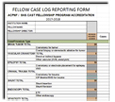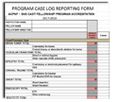Application Process for
ACPNF Fellowship Accreditation
To apply for pediatric neurosurgery fellowship accreditation through the ACPNF, the proposed program director should submit the following information:
- A summary of the organizational structure of the pediatric neurosurgery division and proposed fellowship experience, including:
- Responsibilities of the fellow;
- Numbers of neurosurgery residents on the pediatric neurosurgery service with the fellow and their roles, responsibilities, and anticipated hierarchy in the operating room;
- Formal educational conferences in which the fellow will participate
- Research expectations of the fellow, if any
- A listing of all Pediatric Neurosurgical faculty and their ABNS and ABPNS eligibility/certification status:
- There must be a minimum of three pediatric neurosurgeons on the program faculty. At least two of these three neurosurgeons, including the program director, must be American Board of Pediatric Neurosurgery (ABPNS) certified pediatric neurosurgeons and at least one other either ABPNS-certified or eligible.
- It is the ABPNS, not the ACPNF, that determines eligibility requirements for ABPNS certification. Current eligibility requirements for ABPNS certification include:
- (1) Completion of a ACPNF-accredited fellowship and
- (2) ABNS certification
For specific questions about ABPNS eligibility requirements please contact the ABPNS directly.
- The program must be affiliated with a residency training program approved by the Accreditation Council for Graduate Medical Education (USA) or Royal College of Physicians and Surgeons of Canada.
- A Case Log of operations performed during the immediately preceding year (July 1-June 30)
- The program's annual number of cases must be 400 or greater
- The case log should include only cases performed in the operating room and should be submitted using the case log reporting forms for the fellow and program that are provided by the ACPNF.
The
ACPNF case log reporting forms may be accessed below and include a list of minimum case number requirements for both the program and the fellow.
- ACPNF program case log (link as of 2/25)
- ACPNF fellow case log (link as of 2/25)
- All programs must provide a comprehensive surgical experience to fellows including the following minimum case standards for each graduating fellow at the completion of the fellowship year:
- brain tumor including craniotomy and biopsy (20 cases)
- vascular craniotomy including bypass (5 cases)
- epilepsy cases including craniotomy and VNS (10 cases)
- cranial trauma cases including craniotomy and EVD/ICP monitor for trauma (5 cases)
- shunt insertion or revision (30 cases)
- endoscopy including ETV or other (10 cases)
- spasticity cases including Baclofen pump or dorsal rhizotomy (5 cases)
- myelomeningocele or complex tethered cord repair (3 cases)
- spine instrumentation (5 cases)
- Chiari decompression (5 cases), and
- craniofacial repair (10 cases).
- Support letters from the following departments/divisions/sections within the institution:
- Pediatric Neurology
- Critical Care Medicine
- Pediatric Anesthesiology
- Pediatric Surgery
- Neuropathology
- Pediatric Neuroradiology
- The Chairman of the Neurosurgical Residency Program
Timeline for the Submission of an ACPNF Fellowship Application
The ACPNF meets twice each year – once in conjunction with the Pediatric Neurosurgery Joint Section meeting in late November-early December, and once in conjunction with the AANS annual meeting in the spring. Since applications for new fellowship programs are discussed at these meetings, and since the applicant fellowship match list submission occurs in November of each year for fellowships beginning the following July, institutions wishing to establish an ACPNF-accredited fellowship should provide all written materials described above to the ACPNF Board of Directors in a timely fashion. Once these materials are received, the Board of Directors will review the materials and coordinate a site visit with the institution. The applying institution is responsible for all travel expenses for the site evaluator, as well as a $500 application fee.
The suggested timeline for application is as follows:
Submit all required materials to the ACPNF Secretary
|
Before Pediatric section meeting in November-December |
ACPNF Board Directors meet in conjunction with Pediatric Neurosurgery Section meeting to review the documentation and decide on preliminary approval of the fellowship |
During Pediatric Section meeting |
Site visit coordinated with institution |
December -March |
Report of site visitor reviewed by ACPNF Board members for final approval; programs will be notified regarding a decision by email with a letter from the ACPNF secretary. |
April AANS meeting or before |
Maintenance of Accreditation
Criteria for continuing re-accreditation will include case volume (total case volume of 400 or more cases per year as well as fellow participation in minimum required case volume for each case category as specified above), maintaining adequate faculty numbers and faculty ABPNS certification status, and payment of dues. Fellows may complete the fellow case logs, but the fellowship director will be responsible for both submitting the information and confirming its accuracy. Case log data will be made available to the public on the ACPNF web site and updated each year.
Programs will ordinarily be re-accredited on an ongoing basis. Triggers for evaluation of accreditation include:
- Decrease in case volume below the requirements either in general or by category
- Concerning findings on the fellow survey
- Match irregularities
- Failure to train at least one post-residency fellow (FMG, DO, or MD) once every 5 years*
- Changes to program leadership
*A fellowship program not matching a post-residency fellow (FMG, DO, or MD) once every 5 years will be required to provide a written statement of commitment from the fellowship director and the chair of the program that they are still dedicated to training pediatric neurosurgery fellows. |










